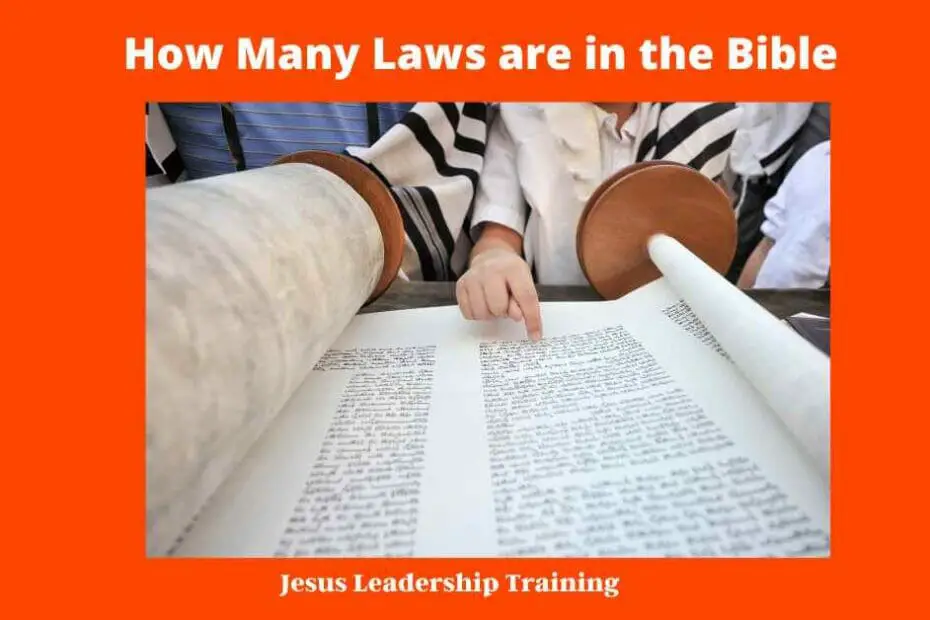How Many Laws are in the Bible – The Old Testament contains 613 Laws, The New Testament has 2 and focuses on Faith and Grace. The Bible is the most important book in the Christian faith, containing the sacred scriptures of God. But how many laws are there in the Bible? This is an important question to consider, as the laws in the Bible shape the lives of millions of people who follow its teachings.
Table of Contents
How Many Laws are in the Bible | Old Law (613) | New Law (2)
From the Ten Commandments to the Laws of Moses, the Bible contains a multitude of laws. These laws have been a source of inspiration, guidance, and instruction to many over the centuries. The Bible is filled with a variety of laws, and each book of the Bible offers its own set of laws. In this blog, we explore the laws in the Bible, examining how they are presented in each book, and analyzing their impact on modern society.
The Bible is divided into two parts: the Old Testament and the New Testament. The Old Testament contains a large portion of the laws of God, many of which were given to the Israelites through Moses. In the Old Testament, there are 613 commandments, known as the 613 mitzvot. This includes laws about civil and criminal justice, as well as religious and moral laws. They are divided into 248 positive commandments and 365 negative commandments.
The majority of these laws were given to Moses on Mount Sinai, (god chosen people) when God chose the Israelites as his holy nation. According to the Old Testament, these laws were given by God to Moses, Aaron, and the people of Israel in the year 1450-1410 BC. These laws are found in the books of Exodus, Leviticus, and Deuteronomy, and are known as the Mosaic Law, or the Law of Moses.
The New Testament also contains laws, but they are different in nature than the laws of the Old Testament. Instead of laws that are meant to be followed strictly, the New Testament contains many examples of how Jesus and his followers lived their lives according to God’s will. The New Testament also contains stories of how Jesus used his miracles and other experiences to teach people about God ( israel key idea) and how to live according to His will.
The laws of the Bible are not meant to be followed blindly. Instead, they are meant to be interpreted and applied in a way that is best suited to the modern world. This is why many religious scholars and theologians take the time to study the Bible and its laws in order to better understand the teachings of God and how they apply to our lives today.
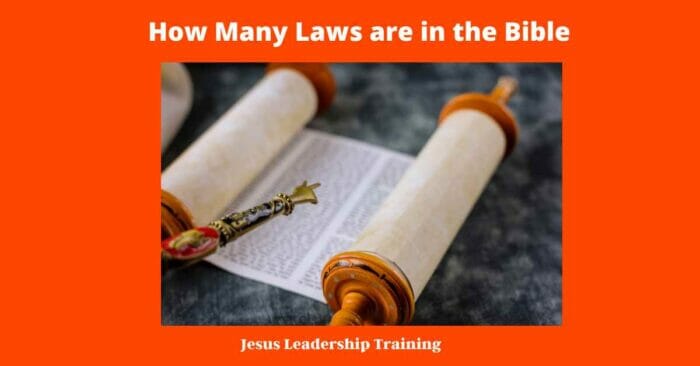
Overall, the Bible contains many laws and regulations that are meant to be followed by God’s chosen people. While the exact number of laws is unknown, it is clear that the Bible contains many important teachings that have shaped the lives of millions of people throughout the centuries. By studying and understanding these laws, we can learn more about the will of God and how it can help guide us in our lives today.
What are the 10 Commandments – What do they Mean
The Ten Commandments are a set of rules given to the Israelites by God as a way to guide their lives and live in harmony with one another. They are found in the Bible in the book of Exodus, chapters 20 and Deuteronomy 5. They are often seen as a summary of the laws of the Bible, and they are the most well-known laws in the Bible. These laws have been interpreted differently throughout history, but the original intent is clear.
The Ten Commandments are divided into two parts: six “You” commandments, which are concerned with man’s relationship with God, and four “You shall not” commandments, which are concerned with man’s relationship with other people. Let’s take a closer look at each of these commandments and what they mean.
- “You shall have no other gods before me.” This commandment is about putting God first in our lives, and not worshipping other gods or idols. It is about recognizing that God is the only true God, and all other gods are false.
- “You shall not make for yourself an idol.” This commandment is about not creating false gods or idols and worshipping them.
- “You shall not take the name of the Lord your God in vain.” This commandment is about not using the name of God in an offensive or disrespectful manner.
- “Remember the Sabbath day, to keep it holy.” This commandment is about setting aside one day each week to rest and worship God.
- “Honor your father and your mother.” This commandment is about respecting and honoring our parents.
- “You shall not murder.” This commandment is about not taking the life of another person.
- “You shall not commit adultery.” This commandment is about being faithful to one’s spouse.
- “You shall not steal.” This commandment is about not taking the property of another person without permission.
- “You shall not bear false witness against your neighbor.” This commandment is about not lying or giving false testimony against another person.
- “You shall not covet.” This commandment is about not desiring what belongs to another person.
The Ten Commandments are not only the foundation of the laws of the Bible, but they are also the foundation of many of the laws and moral codes found in modern societies. They are seen as a universal code of ethics that all people should strive to follow. They emphasize the importance of honoring God, respecting other people, and living a life of integrity and justice. While the specific interpretations of these commandments may vary from culture to culture, the basic principles remain the same. They are a reminder of the importance of living a life of faith and following God’s laws.
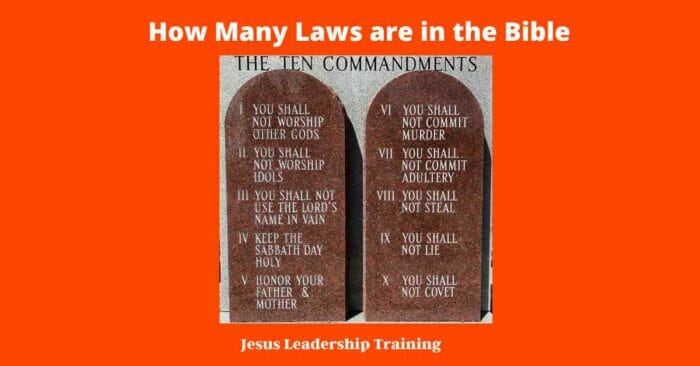
Examining the Laws of Leviticus in the Bible
The book of Leviticus contains the laws of Moses, which were given to the Israelites while they were in the wilderness. These laws are divided into three main categories: the laws of sacrifices and offerings, the laws of purification and cleanliness, and the laws of social justice and morality. These laws were meant to create a holy community in which everyone was to abide by the same rules and regulations.
The laws of sacrifices and offerings were meant to be a way for the Israelites to show gratitude and reverence for their God. These laws instructed them how to offer sacrifices and offerings to God, such as grain, wine, and animals. In addition, these laws provided instructions on the proper procedures to be followed when making a sacrifice.
The laws of purification and cleanliness were meant to ensure the physical and spiritual health of the Israelites. These laws instructed them on how to cleanse themselves, their homes, and their food before eating it. In particular, these laws prohibited the eating of certain animals, such as pigs and shellfish, and also provided instructions on how to observe the Sabbath day.
The laws of social justice and morality were meant to ensure that the Israelites lived in a fair and just society. These laws instructed them on how to treat their neighbors and how to handle issues such as theft, adultery, and other crimes. In particular, these laws outlined the punishments for certain offenses and also provided guidance on how to resolve disputes.
How God’s Laws are Presented in Deuteronomy
The book of Deuteronomy contains the laws of Moses, which were given to the Israelites as they prepared to enter the Promised Land. These laws are divided into four main categories: civil, social, religious, and ceremonial.
The civil laws provide instructions on how to govern the nation of Israel, including the selection and duties of leaders, the administration of justice, and the regulation of public behavior. These laws also outlined the punishments for certain offenses and provided guidance on how to resolve disputes.
The social laws provide instructions on how to behave in relationships with one another, including prohibitions against stealing and killing, as well as moral standards for marriage and sexual behavior. These laws also provided guidelines on how to treat strangers and foreigners.
The religious laws provide instructions on how to observe the various religious festivals and ceremonies, as well as instructions on how to build and maintain the Tabernacle and its furnishings. These laws also outlined the duties of the priests and Levites in the service of God.
The ceremonial laws provide instructions on how to observe the various festivals and ceremonies, as well as instructions on the rites of passage for men and women. These laws also provided guidance on how to observe the Sabbath day.
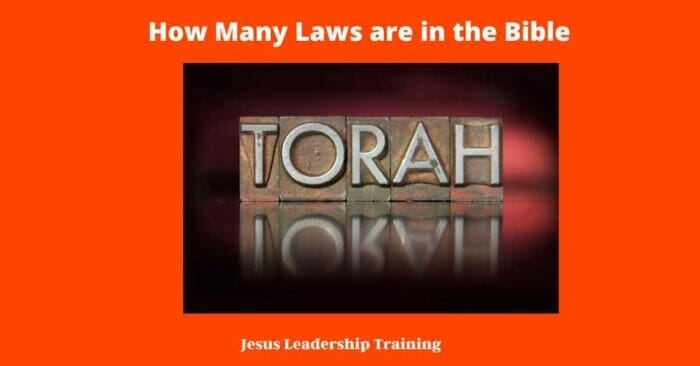
Analyzing the Laws of Exodus in the Bible
The book of Exodus contains the laws of Moses, which were given to the Israelites as they prepared to leave Egypt. These laws are divided into two main categories: the laws of worship and the laws of holiness.
The laws of worship provide instructions on how to observe the various religious festivals and ceremonies, as well as instructions on how to build and maintain the Tabernacle and its furnishings. These laws also outlined the duties of the priests and Levites in the service of God.
The laws of holiness provide instructions on how to live a holy life, including prohibitions against idolatry and adultery, as well as moral standards for marriage and sexual behavior. These laws also provided guidance on how to treat strangers and foreigners.
Unveiling the Laws of Numbers in the Bible
The book of Numbers contains the laws of Moses, which were given to the Israelites as they prepared to enter the Promised Land. These laws are divided into two main categories: civil and religious.
The civil laws provide instructions on how to govern the nation of Israel, including the selection and duties of leaders, the administration of justice, and the regulation of public behavior. These laws also outlined the punishments for certain offenses and provided guidance on how to resolve disputes.
The religious laws provide instructions on how to observe the various religious festivals and ceremonies, as well as instructions on how to build and maintain the Tabernacle and its furnishings. These laws also outlined the duties of the priests and Levites in the service of God.
A Study of the Biblical Laws of God
The laws of God are found throughout the Bible. These laws are divided into three main categories: the laws of justice, the laws of love, and the laws of holiness.
The laws of justice provide instructions on how to ensure that the nation of Israel is a just and righteous nation, including the selection and duties of leaders, the administration of justice, and the regulation of public behavior. These laws also outlined the punishments for certain offenses and provided guidance on how to resolve disputes.
The laws of love provide instructions on how to love one another, including prohibitions against stealing and killing, as well as moral standards for marriage and sexual behavior. These laws also provided guidelines on how to treat strangers and foreigners.
The laws of holiness provide instructions on how to live a holy life, including prohibitions against idolatry and adultery, as well as moral standards for marriage and sexual behavior. These laws also provided guidance on how to treat strangers and foreigners.
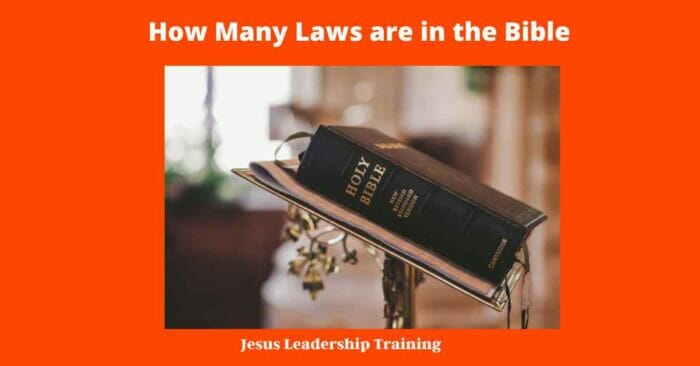
Exploring the Meaning of the Laws in the Bible
The laws in the Bible were not simply meant to be followed blindly. Rather, they were meant to be studied and understood, so that the Israelites could learn to recognize and appreciate the holiness and justice of God. These laws were meant to help the Israelites cultivate a healthy relationship with God and with each other, and to demonstrate their obedience to God.
The laws in the Bible also reveal the heart of God. They demonstrate God’s love for his people and his desire for their good. They show his desire for justice and mercy and his commitment to the sanctity of life. They also show his mercy, grace, forgiveness, and his love for the sinner and the righteous alike.
Investigating the Relationship Between Laws and God in the Bible
The relationship between laws and God is an important one. On the one hand, the laws in the Bible can be seen as a way for God to show his authority and power. By giving his people laws to follow, God is displaying his sovereignty and his desire for his people to be obedient to him.
On the other hand, the laws in the Bible can also be seen as a way for God to express his love and concern for his people. By providing laws to protect them and to guide them in their daily lives, God is demonstrating his commitment to their wellbeing. He is also showing his desire for them to live holy and righteous lives in line with his will.
Understanding the Impact of the Laws in the Bible on Modern Society
The laws in the Bible have had a profound impact on modern society. They have provided a source of inspiration and guidance for many, and have been used as the basis for many laws and codes of conduct. For example, the Ten Commandments have been a source of guidance for many over the centuries.
The laws in the Bible also serve as a reminder of the importance of justice and mercy, and of the need to treat others with respect and kindness. They also demonstrate the importance of living a life of holiness and righteousness in line with God’s will.

What are the Three Types of Law in The Torah – Judicial, Ceremonial. and Moral
The Torah, or the Five Books of Moses, contains a variety of laws. These laws are divided into three main categories: judicial, ceremonial, and moral.
The judicial laws provide instructions on how to govern the nation of Israel, including the selection and duties of leaders, the administration of justice, and the regulation of public behavior. These laws also outlined the punishments for certain offenses and provided guidance on how to resolve disputes.
The ceremonial laws provide instructions on how to observe the various religious festivals and ceremonies, as well as instructions on the rites of passage for men and women. These laws also provided guidance on how to observe the Sabbath day.
Below is a table that broadly categorizes and describes the laws as found in the Old Testament, New Testament, Torah, and Midrash:
| Text | Laws |
|---|---|
| Old Testament | The Old Testament, especially in the books of Exodus, Leviticus, Numbers, and Deuteronomy, contains the Mosaic Law, including the Ten Commandments. These laws include ceremonial laws about worship, civil laws about social relations, and moral laws about personal conduct. |
| New Testament | The New Testament primarily focuses on the teachings of Jesus and the apostles, emphasizing love, grace, and the fulfillment of the Mosaic Law through Jesus. It doesn’t introduce new legal codes but offers moral and ethical teachings, like the Sermon on the Mount and the two greatest commandments: Love God and love your neighbor. |
| Torah | The Torah, the first five books of the Old Testament, contains 613 commandments or mitzvot. These laws include instructions on religious observances, dietary laws, rules about social justice, and more. This includes the Ten Commandments, which are considered the cornerstone of these laws. |
| Midrash | The Midrash is not a set of laws but a method of interpreting biblical stories. It elaborates on the narratives in the Bible, offering insight and clarifying ambiguous passages. However, it does discuss and explain laws found in the Torah, offering context and additional explanations. |
Please note that the interpretation and application of these laws can vary significantly among different Jewish and Christian denominations and traditions.
The moral laws provide instructions on how to live a righteous and holy life, including prohibitions against idolatry and adultery, as well as moral standards for marriage and sexual behavior. These laws also provided guidelines on how to treat strangers and foreigners.
Other Important Thoughts
- Law – Divided into Old Law and New Law
- Bible is Man’s Moral Compass
- Laws Give Direction to People
- Gospel is called the Good News – Simplifying our Actions with Others
- Biblical Scriptures contain the First Biblical Guides
- How many Laws in the Total Bible
- Old Testament laws we should follow
- Regulations and Suggestions
- Old Testament Scriptures
- Why So many
- Key people Moses, and Jesus
- Israel key people – Moses
- God Holy Nation – One that is Righteous
- Author Moses Date – 1450 BC
- God Holy Law – Tablets
- People Moses Aaron
- Moses Date 1450-1410
- Experiences God People in Wilderness
- Key People Adam, Abraham, Moses, Elijah, Jesus
- Holy People Leviticus
- Priest
- Chosen people Israel
- Disobedience key people
- Nation Exodus Redemption – God Leading them from Sin
- Abraham god promised to his Seed
- Israel key idea – Be Holy as I am Holy
- God chosen people to Guide all mankind
How Many Laws are in the New Testament
The New Testament does not contain the same type of legal code that the Old Testament does. Instead, the New Testament focuses more on topics such as faith, grace, and love. However, the New Testament does contain some laws, such as the commands to love one another, to forgive those who wrong us, and to not judge others.
What is the difference between Law and Grace?
The distinction between law and grace is an important one. The law is a set of rules or standards that must be followed in order to be obedient to God. These laws can be found throughout the Old Testament. Grace, on the other hand, is the unmerited favor of God. It is the love and mercy of God that is extended to us even though we do not deserve it. Grace is found throughout the New Testament, and it is through grace that we are saved and given eternal life.
here is a table that compares the concept of the Law in the Old Testament and the concept of Grace in the New Testament:
| Aspect | Law (Old Testament) | Grace (New Testament) |
|---|---|---|
| Nature | The Law, mainly found in the first five books of the Old Testament, outlines the commandments and standards God set for the Israelites. It includes moral, ceremonial, and civil laws. | Grace, a prominent theme in the New Testament, refers to the unmerited favor and love of God towards humanity. It’s God’s willingness to forgive sin and bestow blessings freely through Jesus Christ. |
| Role | The Law defined sin and provided a framework for living righteously. It set standards of behavior and held people accountable to those standards. | Grace is God’s response to human sin and failure. Through Grace, God provides salvation and eternal life as a free gift, received through faith in Jesus Christ. |
| Impact on Salvation | In the Old Testament, obedience to the Law was connected with blessings and prosperity, while disobedience was met with divine punishment. It did not, however, offer a complete solution to sin. | In the New Testament, salvation is presented as a gift received through faith in Jesus Christ, not by obeying the Law. This is possible because of God’s grace. |
| Manifestation | The Law was given to Moses on Mount Sinai and was manifested in the form of commandments on stone tablets. | Grace is personified in Jesus Christ, who offered himself as a sacrifice for humanity’s sins, offering forgiveness and reconciliation with God. |
| Covenant | The Law is associated with the Mosaic Covenant, a conditional agreement that required the Israelites’ obedience in return for God’s blessings. | Grace is associated with the New Covenant, an unconditional agreement based on faith in Jesus Christ. Under this covenant, sins are forgiven and the law is written on human hearts. |
Please note that this table simplifies complex theological concepts and interpretations can vary widely among different Christian denominations and biblical scholars.
How Many Laws are in the Bible: A Comprehensive Analysis
Delve into the vast world of Biblical laws, exploring the Old Testament commandments, the added laws of the Pharisees, and the significance of the initial five books. This article unravels the historical, cultural, and theological aspects of these laws.
How Many Commandments are There in the Old Testament
The Catholic Perspective
In the Catholic tradition, the Old Testament is revered as a rich repository of moral and theological laws. The Ten Commandments or Decalogue, given to Moses at Mount Sinai, are of particular significance. They represent the fundamental moral laws that govern the lives of believers. However, these ten are just the tip of the iceberg. Biblical scholars generally agree that the Torah contains 613 commandments or ‘mitzvot’.
The Role of Moses
Moses is a central figure in the Old Testament and the vehicle through which God delivers his laws to the Israelites. The Book of Exodus narrates the iconic moment where Moses receives the Ten Commandments. Beyond these, however, Moses also relayed the remaining 603 laws found in the subsequent books of Leviticus, Numbers, and Deuteronomy.
Where are the Commandments Found?
The 613 laws aren’t all located in one place within the Bible. Instead, they are dispersed across several books, primarily the Pentateuch or the first five books of the Old Testament, also known as the Torah. The Ten Commandments first appear in Exodus 20, with the rest scattered throughout Exodus, Leviticus, Numbers, and Deuteronomy.
How Many Laws did the Pharisees Add
Tradition of the Elders
Over time, Jewish leaders, including the Pharisees, developed the ‘Oral Torah’. This consisted of traditions and interpretations that aimed to elaborate on and apply the original 613 Mitzvot to everyday life. These laws were eventually compiled in the Talmud, significantly increasing the total number of regulations followers were expected to observe.
The Ridiculous Laws
The Pharisees’ laws often appeared absurd, excessive, or overly meticulous to outsiders. Examples include prohibitions on actions such as tying a knot on the Sabbath or regulations on the proper procedure for handwashing. These laws seemed to elevate ritualistic conformity over genuine faith and moral integrity.
here’s a table outlining some of the laws the Pharisees held that might seem absurd or extreme to many today. Remember that these laws are contextual, often reflecting the specific societal and religious conditions of their time.
| Pharisee Law | Explanation |
|---|---|
| Ritual Hand Washing | Pharisees insisted on careful washing of hands before meals, even when the hands were evidently clean, to ensure ritual purity. |
| Sabbath Restrictions | The Sabbath was strictly observed, with restrictions such as not traveling more than a specific distance or not carrying any kind of burden. |
| Tithing of Small Herbs | Pharisees demanded a tithe of all produce, including small herbs like mint, dill, and cumin, regardless of the amount. |
| Touching a Corpse | A Pharisee would be considered ritually unclean if they touched a corpse, which would then require a period of cleansing. |
| Associating with “Sinners” | Pharisees often avoided socializing with those they considered sinners, to maintain their perceived righteousness. |
| Eating Food Prepared by Non-Pharisees | Eating food prepared by someone who was not a Pharisee was often avoided due to concerns about ritual purity. |
| Swearing by the Temple and the Gold of the Temple | Pharisees engaged in intricate discussions about the relative sacredness of different types of oaths, which Jesus criticized (Matthew 23). |
| Intricate Rules about Purity and Impurity | The Pharisees had numerous and complex laws around what objects or actions could render a person or a thing “unclean”. |
| Wearing Special Garments | Pharisees wore distinct clothing, like wide phylacteries and long tassels, to display their piety and commitment to the law. |
| Ceremonial Washing of Cups, Pitchers, and Kettles (Mark 7) | Pharisees insisted on the ceremonial washing of vessels, extending purity laws beyond what was specified in the Torah. |
Please note that these laws were observed in the spirit of religious devotion and piety. To modern readers, they may appear strange, overly detailed, or excessive, but they were an integral part of Pharisee life and belief systems.
What Law did Pharisees Follow?
The Pharisees followed the written Torah (the Old Testament) and the Oral Torah, which included their additional interpretations and traditions. Their devotion to these laws was intense and uncompromising, leading to Jesus’s criticism of their hypocrisy and legalism in the New Testament.
Five Laws of the Bible
The First Five Books
The initial five books of the Old Testament, also known as the Pentateuch or the Torah, contain the bulk of the biblical laws. These books, Genesis, Exodus, Leviticus, Numbers, and Deuteronomy, narrate the creation, the patriarchs’ lives, the exodus from Egypt, the covenant at Mount Sinai, and the wanderings in the desert. These narratives serve as the context in which the laws are presented.
The Torah
The Torah is the heart of Jewish law, belief, and practice. It’s not simply a collection of laws but a detailed account of God’s covenant with His chosen people. The 613 commandments found within its texts provide comprehensive guidelines for religious observance, social justice, and personal morality.
Who Wrote the First Five Books?
Traditionally, Moses is regarded as the author of the Pentateuch. However, modern scholarship often points to multiple authors over several centuries. This theory, known as the Documentary Hypothesis, suggests the Torah is a compilation of various ‘documents’, each with distinctive stylistic and thematic elements.
ere’s a table that provides an overview of the five books of the Torah and their traditional authors.
| Book of Torah | Traditional Author | Brief Description |
|---|---|---|
| Genesis | Moses | Genesis, the first book of the Torah, provides an account of the world’s creation, the early stories of humanity, and the origins and early history of the Israelites. |
| Exodus | Moses | Exodus recounts the story of the Israelites’ liberation from slavery in Egypt, their journey through the wilderness, and the receipt of the Ten Commandments. |
| Leviticus | Moses | Leviticus is primarily composed of laws. Many of the laws relate to offerings and sacrifices, purity, and holiness. |
| Numbers | Moses | Numbers tells the story of the Israelites’ journey in the wilderness. It includes a census of the tribes, laws, and narratives. |
| Deuteronomy | Moses | Deuteronomy is a series of speeches given by Moses to the Israelites before they enter the Promised Land. It revisits many of the laws from the previous books and adds some new ones. |
Please note that while traditional Jewish belief attributes the authorship of the Torah to Moses, most modern scholars agree that the Torah is a composite work from various sources, and its final form was not achieved until long after Moses’ time.
Frequently Asked Questions
- What are the 613 commandments in the Bible?
The 613 commandments, or ‘mitzvot’, are laws contained in the Torah, the first five books of the Bible. They include moral, ceremonial, and legal rules guiding the life of a believer. - Why did the Pharisees add more laws?
The Pharisees added more laws to help apply the biblical commandments to everyday situations. These laws were part of the Oral Torah and were later recorded in the Talmud. - Are Christians required to follow the 613 commandments?
Christian perspectives vary. Some believe that Christ’s sacrifice freed believers from the obligation to follow Old Testament laws. Others believe that while ceremonial and civil laws may not apply, moral laws still do. - What is the significance of the first five books of the Bible?
The first five books, or the Torah, lay the foundation for Jewish faith and identity. They contain historical narratives, laws, rituals, and ethical guidelines, establishing the covenant between God and His people. - What does the term ‘law’ mean in the Bible?
The term ‘law’ in the Bible often refers to the commandments or rules given by God to guide His people. It can also refer to the Torah (the first five books of the Old Testament) or the entire Old Testament itself. - Are the Pharisees’ laws still followed today?
Yes, many Orthodox Jews still follow the Pharisaic traditions recorded in the Talmud, along with the original 613 commandments.
Final Thoughts – How Many Laws are in the Bible
The Laws in the Bible can be Summarized by:
- The Old Law
- The New Law
- The 10 Commandments
- Judicial, Ceremonial, and Moral Law
- Law of Love and Grace
God Bless Greg



